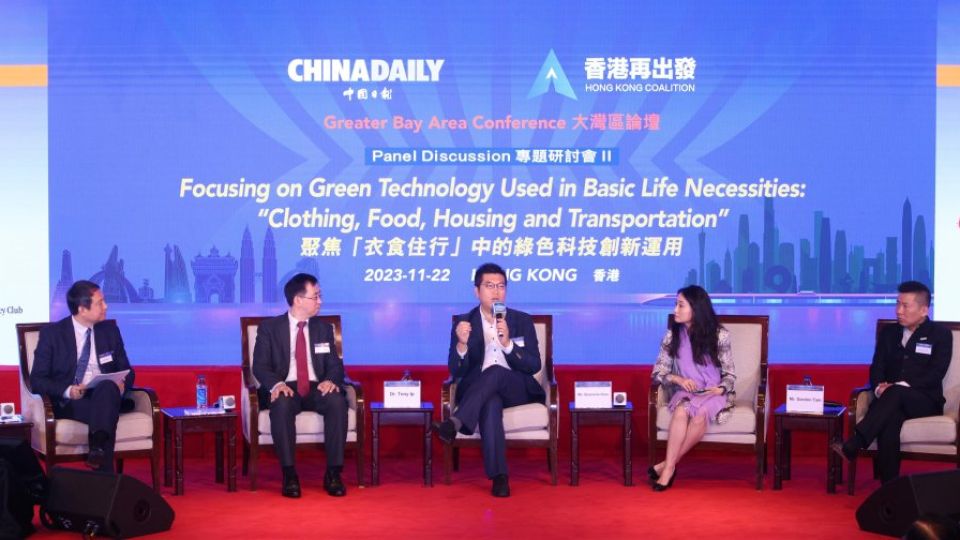November 23, 2023
HONG KONG – Experts and business leaders have stressed the importance of building an ecosystem for driving green cooperation between the Guangdong-Hong Kong-Macao Greater Bay Area and the Association of Southeast Asian Nations, emphasizing the significance of adopting green practices in sectors like farming, fashion and architecture to create a better future.
They made the remarks at a panel discussion about the integration of green technology in daily life during the Greater Bay Area Conference 2023 held in the Hong Kong Special Administrative Region on Wednesday. The conference, co-organized by China Daily and Hong Kong Coalition, was themed “When GBA Meets ASEAN – One Heart and One Mind”.
Philip Ng Kim-lam, vice-chairman of the Green Development Institute, said there’s a lot of synergy between the GBA and the 10-member ASEAN grouping, particularly in green technology.
He emphasized the importance of building a green technology and green finance ecosystem that would bring together leading corporations, investors, professionals and incubators to boost collaboration between the two regions.
“We can also work to promote cross-border collaboration, facilitate capital flow to support green activities and establish voluntary carbon standards for ASEAN member states to meet the increased need for carbon trading in the region,” Ng said, adding that his institution is setting up an international green technology and investment alliance in the GBA.
Gordon Tam Chi-ho, founder and chief executive officer of Farm66 Investment – an agriculture technology pioneer in Hong Kong that has developed the city’s first indoor aquaponics farm – said green technology can help to reduce the environmental impact of farming.
“We build multi-layer structures and whole farming systems in industrial areas to enlarge the farming area so that we don’t need to cut down trees for farming. By simplifying the transportation of vegetables, we can help limit Hong Kong’s carbon footprint,” he said.
ALSO READ: HK to play pivotal, special role in green financing
Stephanie Chan Hoi-yee, director of brand, marketing, business development and partnerships at DETERMINANT – a Hong Kong-based men’s clothing online shop specializing in high-quality shirts and accessories – said technology and innovation are pivotal tools for supporting the fashion industry’s environmental efforts, enhancing its operational efficiency, and promoting responsible consumption.
She said technology is key to promoting efficiency on the supplier’s side (in the fashion industry). It can prevent overproduction and overconsumption, and save manufacturing costs. On the demand side, the industry needs to partner with the innovation industry to develop new technologies and raise consumers’ willingness to accept green alternatives.
“Technology and innovation enable precision and amplify output, with precise planning being a paramount aspect. By avoiding excessive creation, production and consumption, we not only curtail costs but also safeguard our environment. This approach simultaneously promotes responsible consumption while preserving our precious natural resources,” Chan explained.
Tony Ip Chung-man, founder of Tony Ip Green Architects, pointed out that comprehensive assessments supported by various tools, which cater to different aspects, including new and existing buildings, and interior design, are instrumental in facilitating the sustainability journey of green buildings.
“In recent years, specialized tools have emerged for data centers to help address their high energy consumption, as well as for schools to help make changes in energy consumption behavior and education. These remarkable advancements not only drive the realization of zero-emission buildings, but also foster the development of zero-emission neighborhoods,” he said.
Liu Da, managing director of CR-CP Life Science Fund and also moderator of the panel discussions, said the core concept of green technology is to improve people’s lives and enable them to live longer and healthier lives. He stressed the need to address the concerns of people living in middle- and low-income economies to help them catch up with the green progress.
READ MORE: HK to ‘connect, add value’ to GBA-ASEAN collaboration
Bill Condon, an international partner & member of the Global Advisory Board of Millenium Associates (UK) and a member of the audience, said these dialogues are critically important to the planet and future generations. He added that both the government and members of the public need to play a more active role in taking concrete action to protect the environment.


